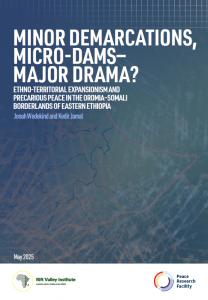The report highlights the overlapping claims to and distributive struggles over territory and resources in the Oromia-Somali borderlands which animated inter-regional competition between the Oromia Regional State (ORS) and Somali Regional State (SRS), resulted in the brief 2023 uptick in violence between the Jarso and Gerri clans, and which potentially pose a risk to previous local peace processes. The report also considers how relatively minor moves, such as re-demarcating or up-scaling administrative units or introducing development projects (e.g. micro-dams for irrigation and wheat production) in the contested Oromia-Somali regional territories can have major consequences—particularly if they should become embroiled in wider geopolitical projects by the Ethiopian government and corresponding shifts in transnational alliances. The report cautions that there is a risk that local tensions in the Oromia–Somali borderlands can be reignited and destabilize the precarious local peace settlement if clan alliances that stretch across the Ethio–Somaliland and Ethio–Somali borderlands are ensnared in the Ethiopian government’s attempts to gain direct access to a port on the Red Sea.
Summary
- In Ethiopia, Oromia Regional State and Somali Regional State remain locked in latent competition to consolidate administrative control over contested areas along their shared border. This is the longest internal regional state border in the Horn of Africa, which was subject to violent conflict and a displacement crisis in 2017–2019.
- The creation of borders for historically fluid identities under ethnic federalism and the displacement crisis during the 2017–2018 political transition has shaped conflict dynamics across the eastern Oromia–Somali regional frontier along the road from Harar to Jigjiga, where the flow of people, goods and capital is vital for both local livelihoods and the national economy.
- Despite relative peace and stability in the eastern borderlands, and between the ORS and SRS under the Prosperity Party (PP) government since 2019, the potential for conflict remains as tensions over unclear boundary demarcations, which have existed since the 2004 regional border referendum, are still largely unresolved.
- Recent reforms to sub-regional administrative units in the Oromia–Somali borderlands have increased intercommunal tensions, spurred on by regional state competition over resources and revenues. These reforms are perceived as regional expansionism. In 2023, unilateral actions by the two regional state administrations resulted in a flare up of border tensions.
- Intercommunal tensions are aggravated by regional state economic interests in securing resources in and revenues from the contested eastern regional borderlands, including through the construction of micro-dams for irrigated wheat farming, which also serve the parallel political purpose of gaining or maintaining administrative control of the contested territories.
- Given the geographic proximity of the north-eastern Oromia–Somali borderlands (and the case study sites Chinaksen and Tuli Guled) to Somaliland, inter-regional state competition between the ORS and SRS (and localized conflicts between the Jarso and Gerri) can become entangled in wider transnational geopolitical projects of the Ethiopian government, such as gaining access to a port on the Red Sea.
- Whereas local communities have shown restraint and a desire for peaceful coexistence during clashes between ORS and SRS militias in 2023, negotiations for peace and stability typically play out at the regional level, which tends to co-opt or sideline community-level peacebuilding. Efforts to transform the tensions arising from the expansionist politics of the two regional states into peaceful coexistence remain crucial for fostering cross-border stability, including social and economic exchange between the borderland communities.
THE ETHIOPIA PEACE RESEARCH FACILITY
This report was written for the Ethiopia Peace Research Facility (PRF) and is part of its Knowledge for Peace (K4P) series on contested borderlands. The PRF is an independent facility combining timely analysis on peace and conflict from Ethiopian experts with support for conflict-sensitive programming in the country. It is managed by the Rift Valley Institute (RVI) and funded by the UK government.
Please find an Amharic summary of the report here.




